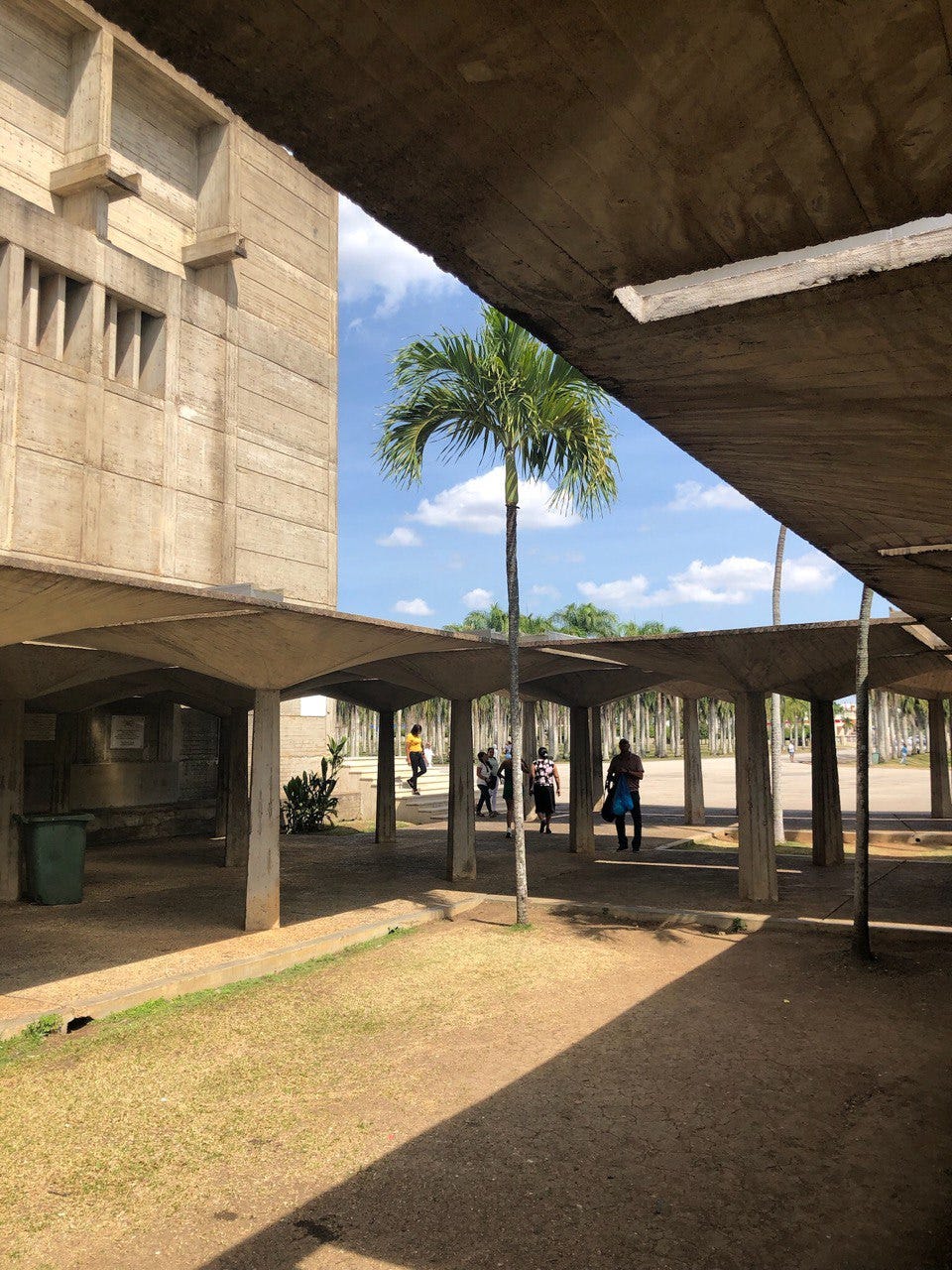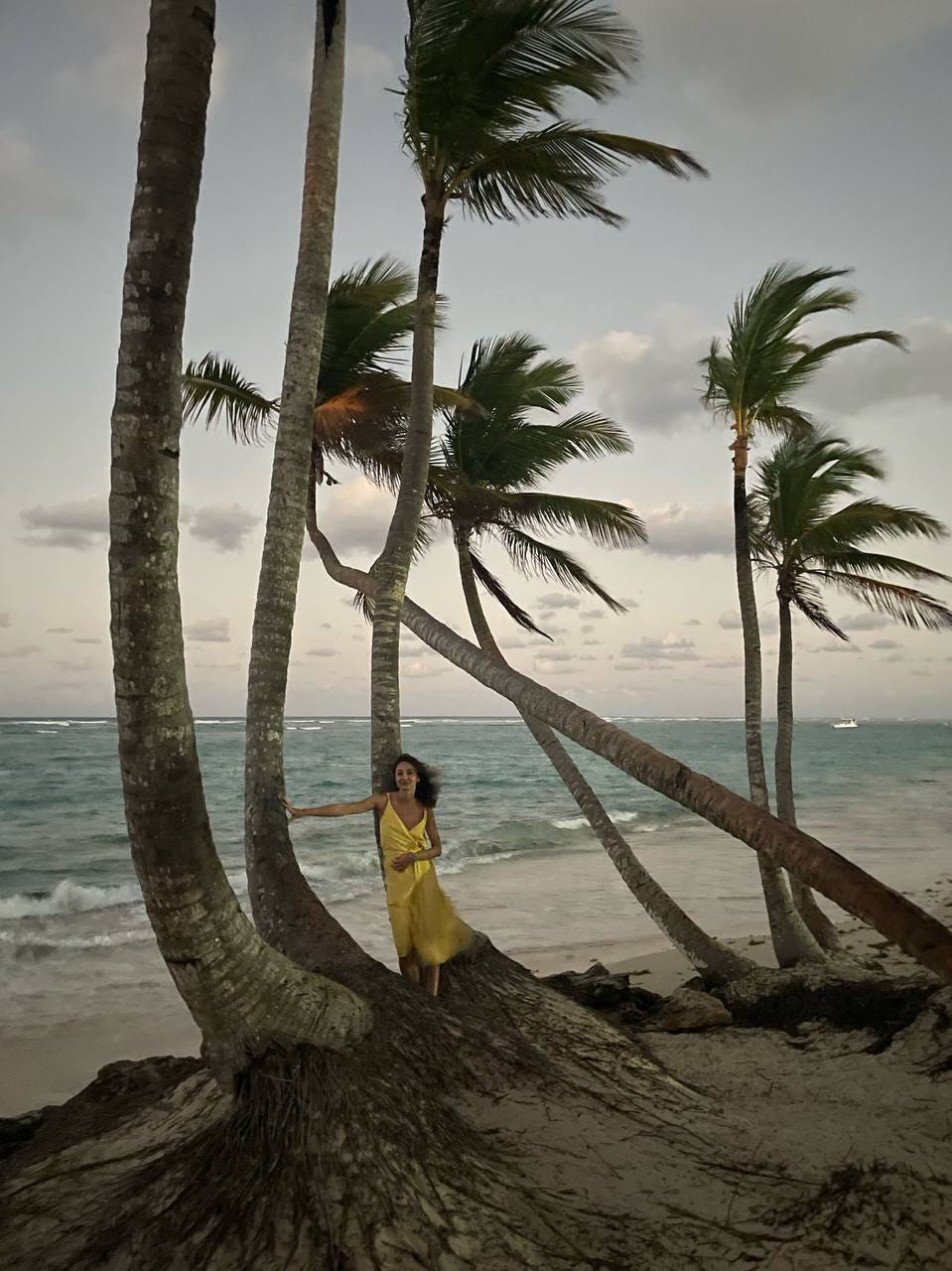A resort is a completely insane experience – a non-place playground that functions on a suspension of disbelief, where nothing is anything.
My dear friend Raina and I ended up at one two weeks ago, after two days of cancelled flights to Mexico and an impulsive decision to get out of the airport one way or another. Getting out of the plane, the air was dense and warm and smelled like sweet dried palm fronds. Hispaniola.
Since I hadn’t planned on going there, I hadn’t read enough about it, so I’ve been doing that over the past few weeks. This rare, accidentally digitized series by Stuart Hall on the Caribbean is perhaps one of the best things I’ve found – here it is for ease:
Redemption Song:
Part 1: Iron in the Soul (A, B)
Part 2: Out of Africa (A, B)
Part 3: Paradise Lost (A, B)
Part 4: La Grande Illusion (A, B)
Part 5: Worlds Apart (A, B)
Part 6: Following Fidel (A, B)
Part 7: Shades of Freedom (A, B)
Hearing someone as brilliant as Hall speak about identity, culture, history, the meaning of freedom, is a pleasure and necessary antidote to the resort experience, which seeks to nullify any curiosity or sense of place.
The island felt hallowed, even just the small corner of it I saw – impossible not think about actual, literal Christopher Columbus landing here. The first real colony, the playbook for conquest and resistance – sugarcane, the Haitian Revolution, Taino rebellions, American occupations. Beach vacations are sold as blank spaces of rest, sun, coconuts, and palm trees, but the Caribbean Sea is as beautiful, bloody, historic, and dense with cultural exchange as any other. In Higuey, we went to a brutalist cathedral that looked like a great ship and I touched an icon of the Virgin Mary that was brought there in 1502. We ate plantains, yucca, avocado, chicken, rice, beans, and had the best beer of my life in a convenience store bar, fished out from the back row of the fridge, colder than cold, nestled in a brown paper bag.
Even the fabricated world of the resort is a fascinating text. While the stamp of colonialism is perhaps the most obvious interpretation (middle class white people lounging, served and professionally smiled at mainly by black Dominicans and displaced Haitians, in hotel chains owned by Europeans), other layers make the experience much more interesting and perhaps less simple, such as the presence of many guests from South America or other Caribbean countries, locals celebrating birthdays, and the dawning sense that the hotel gates serve not to keep locals out but to keep the tourists in.
It took two days of eating at the buffet to realize that while a buffet masquerades as an endless surfeit of options, what it really is is the complete lack of choice. I could see how this could be oddly comforting, reminiscent of childhood. In the limited world of the resort, you are safe, coddled, taken care of. The outside of the resort is pixelated and inaccessible, like the outer limits of a video game. It is all just diverting enough not to require an encounter with the inner life. Constant music, like the spectre of fun, is installed at every corner in order to eliminate any possibility of introspection.
I thought about the need for this kind of all-inclusive, all encompassing rest among the guests – obviously they cannot be begrudged for participating in a phenomenon that exists with or without them. We made an uneasy acquaintance with a chaotic small town Ontario couple called Cody and Melissa, who seemed to be black-out drunk from the moment we arrived until we had the misfortune to be seated next to them on the plane home. Cody, we think, works for or owns a concrete business. It was his first time out of the country. A salt of the earth white Canadian proletarian (though quite likely actually middle class in relative terms) Cody complained to us about his blisters and sunburn, drunkenly overpaid for tchotchkes sold at the beach, got in fights with staff, and barely made it to the airport, where he apparently narrowly avoided arrest. Drunk, enormous Cody blubbered to us on the plane home, when he finally embarked, bleeding profusely from his fist, I’m not a bad guy. I just like to party, as his girlfriend sobbed. How can we begrudge poor Cody’s desire to submerge himself into the imaginary fetal world of the resort, have every edge smoothed off of experience for a week, and exist in a haze of what I’m sure, to him, feels like pleasure?
I don’t want to pretend that I’m not judgmental, because I am, but in my attempt to access a Whitmanian adoration for humanity I latched on Cody’s simple plea I’m not a bad guy, I just like to party to extend him mental grace and forgiveness for being extremely annoying on the flight. With my eyes closed, I heard Cody, and I also heard a baby behind me shrieking. The baby was expressing the plain truth of all experience, shared by everyone ever born: the “inconsolable centres / in the middle of the chest” (Nicole Brossard). Cody, too, was expressing the human, if child-like tendency to want to be loved, accepted, and forgiven for our destructive desire for annihilation.
I should say that I have an extreme dread towards flying. My consciousness struggles wildly against the submission of my will and desire for control to an unknown force. I have to tamp down my flighty consciousness with benzos and intense concentration on my third eye, through which I can catch a glimmer of the non-self self calmly pooling underneath my flailing ego. Clonazepam squeezes my consciousness into a tiny, compressed space, where it rolls around like a marble in a matchbox. Thus contained, I can survive the mental torture of the event.
None of this is to say that my friend and I did not have pleasure, because we did. We adapted to the compressed space of the resort. In fact, I think that the spell of the resort worked on me. I experienced several moments of what felt like pure nothingness, at the beach or next to the pool. I do my best reading lying next to a body of water, the mind unspooling in the absence of distraction and the body disappearing into comfort and languor. I read an old copy of the LRB, coming across an excerpt from a strange, self-published book I was later compelled to purchase. The book is The Demogra-Fate Hypothesis by Thanh Nguyen-Ba, who proffers a theory of doom-acceptance for the inevitable end of humanity, and the earth.
“Cosmic civilizations are epic wildlife spectacles that run their own course over millions of years, and you—a fluky nanosecond of consciousness and curiosity—can do nothing but play tourist and enjoy your part in the action. Your dear species having an inexorable life cycle is hardcore fatalism, but so is your ephemeral alien body dying against the mind’s wish. Make peace with the relentless, unfeeling nature in and around you. Face up to your fleeting moment.”
I found this profoundly comforting, particularly because I was at the beach. The beach is actually perfect for big, existential questions, possibly because your body is so out of the way, and big bodies of water, like mountains, put your small-in-every-way life into humbling perspective. The beauty of it as thrilling as its blankness and indifference towards you. As Bill Callahan says, God’s face on the water, though plain to see, is still hard to read.
On our last day, Raina convinced me to go down a water slide for the first time ever. Normally I am not someone who seeks out adrenaline, but I was trying hard to consciously ungrip from my claspy anxiety. I chose a green and white half open tube that spiraled into a small pool. The first time, I went down almost unwillingly, trying foolishly to slow myself down by holding out my arms against the walls of the slide, which earned me some scratches and laughs from the man who ran this particular slide. I decided to try again and not try to brake no matter what. The second time down I screamed (a lot) and landed in the pool with an enormous sense of catharsis.
I know exactly when I stopped chasing adrenaline – not that I was ever too interested. But I was once fearless and seventeen, seeking that freedom-in-the-pit-of-the-stomach feeling when your self unpeels from its shackles and things seem possible. When I started to get panic attacks, that same stomach-dropping derealization became a terrifying ordeal and I thought I would lose my mind. My life became dramatically smaller, surrounding by vertiginous anxiety, until I made it bigger again, and I think rather courageously made it my business not to accept limitations. But never since have I been able to enjoy Cody’s state of self-annihilating pleasure without a fear that I was just a few notches away from a destruction I wouldn’t be able to return from.
This, I’m aware, is a delusion – loss of control is the human experience – as is how we give the chaos form. Poor Cody, who I’m using here as an avatar of a certain class of white Canadian, reminded me of someone was lost in the chaos of the world. He reminded me of someone who would support the trucker convoy, tap into the collective, childish expression of rage and grief, see himself as much poorer than he really is (driving a new pick up truck though clinging to a working-class identity, though migrant farm workers are more deserving of the title), maybe relish in homoerotic hatred of our too-beautiful Prime Minister.
The professional adolescents in society, who cannot stand to be told what to do (anti lockdowns, anti vax, conspiracy theorists, libertarians), pretend to be afraid to lose their freedom, but the truth is they have far too much freedom as it is. In fact the freedom itself is what is dizzying and scary. The responsibility of existentialism, of having to make your own meaning and your own decisions, is crushing. Perhaps they would prefer a world that had more rigid social rules, a smaller world, with less information, one where you could believe wholeheartedly in some kind of lie and let yourself be comforted by it. They fantasize about the idea that someone (a symbolic parent, bad or good) is indeed in charge, running the world’s machinery, because even the evil conspiracy is more comforting than the truth – the total indifference, the nothingness, the random unspooling of events.
My anxious mind is equally deluded, believing that control is possible, that my fears and worries can in any way influence that same random unspooling. In truth my mental state has nothing at all to do with the flight path or the speed of the slide. In some Joanne Woodward movie, someone says to her something like: You get your cup of time. Drink it or spill it, time doesn’t care.
Yes, me and the Codies are all on the same slide. I can put my arm out to try to brace against experience, but there is only one ending, and it’s the pool at the bottom. You land in it screaming either way.






